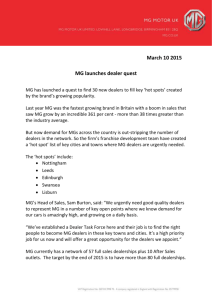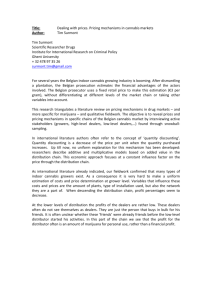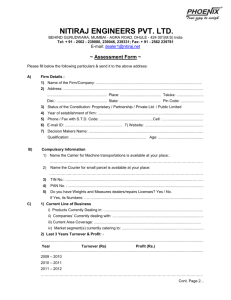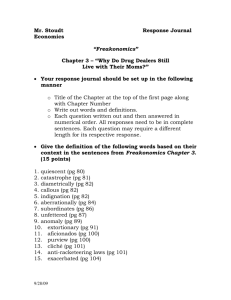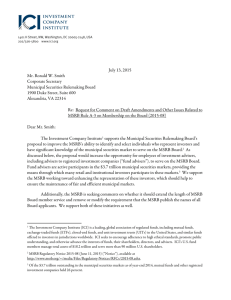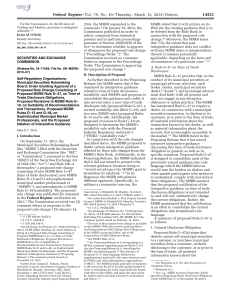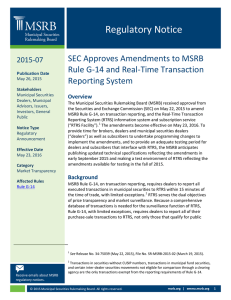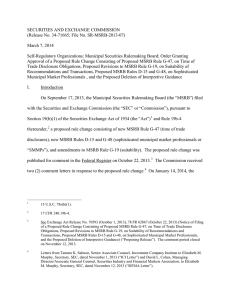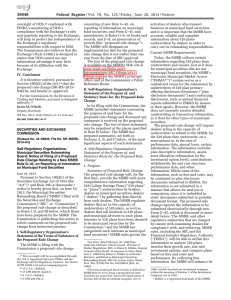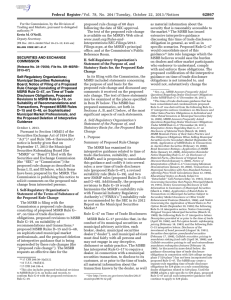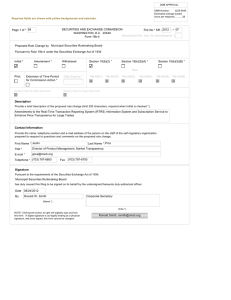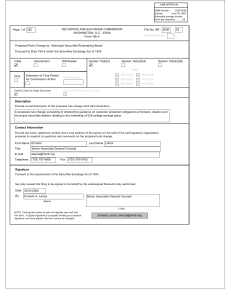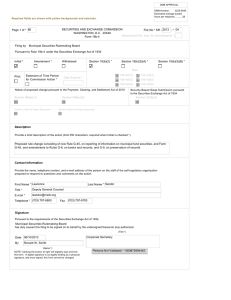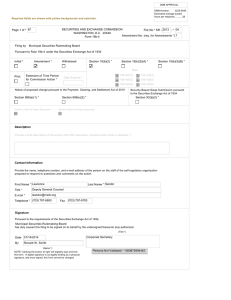11 December 2015 Ronald W. Smith Corporate Secretary Municipal
advertisement
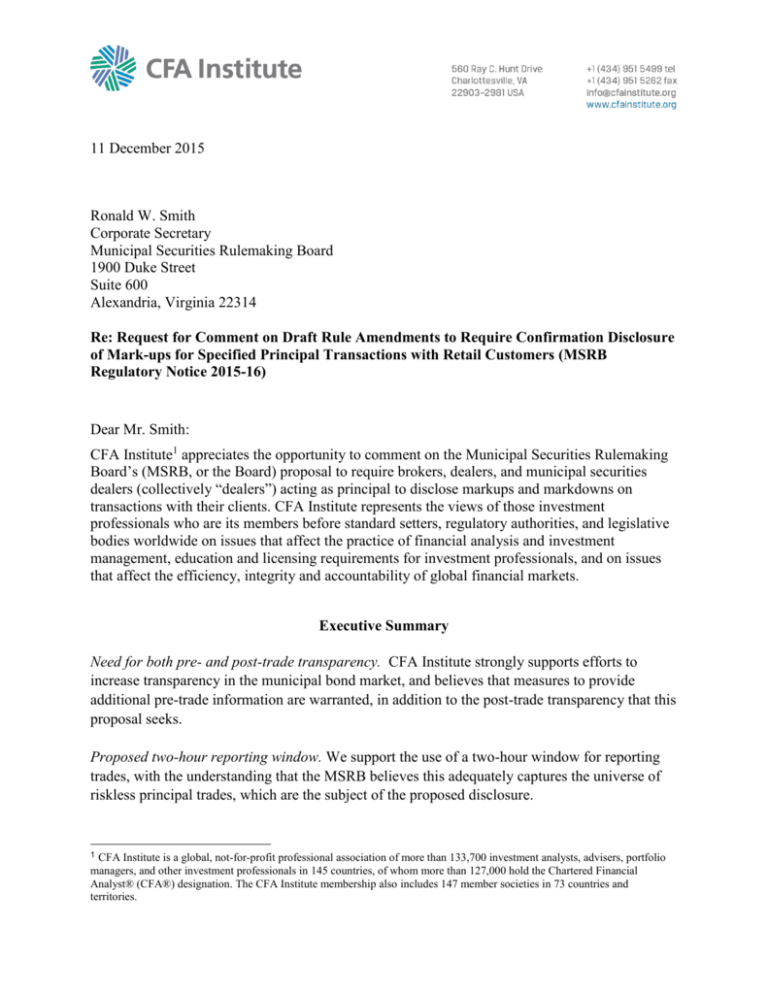
11 December 2015 Ronald W. Smith Corporate Secretary Municipal Securities Rulemaking Board 1900 Duke Street Suite 600 Alexandria, Virginia 22314 Re: Request for Comment on Draft Rule Amendments to Require Confirmation Disclosure of Mark-ups for Specified Principal Transactions with Retail Customers (MSRB Regulatory Notice 2015-16) Dear Mr. Smith: CFA Institute1 appreciates the opportunity to comment on the Municipal Securities Rulemaking Board’s (MSRB, or the Board) proposal to require brokers, dealers, and municipal securities dealers (collectively “dealers”) acting as principal to disclose markups and markdowns on transactions with their clients. CFA Institute represents the views of those investment professionals who are its members before standard setters, regulatory authorities, and legislative bodies worldwide on issues that affect the practice of financial analysis and investment management, education and licensing requirements for investment professionals, and on issues that affect the efficiency, integrity and accountability of global financial markets. Executive Summary Need for both pre- and post-trade transparency. CFA Institute strongly supports efforts to increase transparency in the municipal bond market, and believes that measures to provide additional pre-trade information are warranted, in addition to the post-trade transparency that this proposal seeks. Proposed two-hour reporting window. We support the use of a two-hour window for reporting trades, with the understanding that the MSRB believes this adequately captures the universe of riskless principal trades, which are the subject of the proposed disclosure. 1 CFA Institute is a global, not-for-profit professional association of more than 133,700 investment analysts, advisers, portfolio managers, and other investment professionals in 145 countries, of whom more than 127,000 hold the Chartered Financial Analyst® (CFA®) designation. The CFA Institute membership also includes 147 member societies in 73 countries and territories. MSRB—Mark-ups 11 December 2015 Page 2 Links to EMMA. While we support providing price information to customers when dealers trade as principal, we also recognize that customers in general need more information relating to municipal transactions. We therefore support the proposed links to EMMA that dealers would be required to provide all customers. Discussion As proposed, dealers acting in the capacity of principals would have to disclose a mark-up or mark-down (collectively, “mark-ups”) on certain transactions in municipal securities when the transaction occurs on the same side as their retail customer, and within a two-hour window of that customer’s transaction. The proposal would extend only to non-institutional accounts and would exclude a “list offering price transaction” (e.g., a primary market sale of new issues offered by an underwriter at the list offering price). Not only would proposed amendments to Rule G-15 require disclosure of such mark-ups on relevant customer confirmations, it also would require those confirmations to include a hyperlink and URL to details of the involved security on the MSRB’s Electronic Municipal Market Access (EMMA). The time of trade execution to the nearest minute would also be noted to permit investors to review similar transactions that occurred around the same time as their trades. Disclosure of Mark-ups In particular, dealers would be required to disclose on customer confirmations all transactions in which they transact on the same side as their customer: When the dealer’s transaction equals or exceeds the size of their customers’ orders; and Occur during the two-hour window on either side of their customers’ transactions. For purposes of calculating the mark-up, the proposal notes that the amount to disclose would be “the difference between the price to the customer and the prevailing market price for the security.” This amount would be reported in the confirmation as both a total dollar amount, and as a percentage of the principal amount of the customer’s order. We agree that the MSRB’s proposal addresses a current omission in its rules. MSRB Rule G-15 requires disclosure on the customer confirmation of the amount of the mark-up received on a transaction when dealers act in an agency capacity. It also requires that commissions or service charges for trades executed on an agency basis must be of a fair and reasonable amount. However, there is no such MSRB rule requiring the same type of disclosure when dealers act as principals. We thus support adoption of the proposed disclosures to address this gap and to provide consistency with existing MSRB rules. MSRB—Mark-ups 11 December 2015 Page 3 We also believe this approach serves an important investor protection by alerting investors to occasions when dealers are trading for their own accounts, which may be affecting the prices for their customers’ transactions. By having to disclose the time of the dealers’ purchases or sales, the amount of mark-up, and the percentage the mark-up represents (as a total of their customers’ orders), dealers thus will provide investors information they need to assess the effect on their transactions and their relationships with their dealers. We also agree with the approach the MSRB has taken in defining the situations in which providing such disclosure on customer confirmations is appropriate. First, the proposed “look through” provision would require dealers who trade securities with affiliates (who hold inventory and trade with other market participants) to “look through” to their affiliates’ transactions with the parties with whom they originally bought or sold the securities. In this way, the “look through” would ensure that the disclosed mark-up is a more accurate indication of the compensation paid by customers when dealers and their affiliates effectively function as single entities for purposes of executing retail customers’ transactions. We support this requirement and agree that it serves a reasonable objective of winnowing the group of transactions on which dealers would otherwise have to provide disclosure. In recognizing that certain trading desks of a dealer can operate independently and without knowledge of specific executions handled by other desks, the proposed rule distinguishes between “functionally separate” trading desks in determining which transactions in a customer’s account will be subject to the confirmation disclosure. Under amendments to Rule G-15, a dealer would not have to disclose the mark-up for a customer transaction if the dealer can establish that: (i) the customer transaction was executed by a principal trading desk that is functionally separate from the principal trading desk that executed the dealer’s same-side of the market transaction; and (ii) the functionally separate principal trading desk through which such same-side of the market transaction was executed had no knowledge of the retail customer transaction. In proposing this exemption, the MRSB reasons that this approach recognizes its intent to distinguish between riskless principal trades (“RPTs”) and those requiring disclosures. We believe this approach reasonably accomplishes this goal. Link to EMMA Even if mark-up disclosure is not required, amended Rule G-15 would still require dealers to provide hyperlinks and URL addresses to the pages on EMMA that provide security details for their customers’ accounts and descriptions of what those pages provide. Dealers also would have to disclose the execution times (to the nearest minute) of executions for their customers’ MSRB—Mark-ups 11 December 2015 Page 4 transactions, eliminating the current option for dealers to provide such on as-requested bases. We agree that these two requirements will provide customers with pertinent information and help broaden their understanding of the markets for their securities (and note that certain brokerages already make such information available through their on-line trading systems). Whether to disclose all dealer transactions with retail customers The Board also enquired whether all principal dealer transactions with retail customers should be disclosed, regardless of whether the transactions are on the same side of the market as any particular customer trades. While we see some potential for such information to be useful, we do not believe the marginal benefit gained from such disclosures to retail investors would be worth the potential confusion and additional cost providing that information will produce. In particular, we are worried that the disclosure of all principal transactions with retail customers, rather than only RPTs, will cause “apples-to-oranges” comparisons by investors. Those involving RPTs reflect de facto agency trades where dealers are able to acquire the securities quickly either from affiliates or ready sources on the other side of the market. By comparison, non-riskless principal transaction require dealers to seek the securities in the marketplace and in a manner that may require the dealers to put their capital at risk, even for a short time. Likewise, disclosure of principal trades, even RPTs, occurring on different sides of the market may not provide direct comparisons for investors, as the attitudes of buyers is sure to be different from those of sellers. Comparisons of these types, therefore, could add to investor confusion and to higher costs for firms. Timing Triggers We do not believe that transactions occurring any time during a day on which a trade has occurred should be included in these types of disclosures by dealers. Rather, we believe the twohour window is appropriate. Our reasoning for this perspective is that market prices for securities can change substantially in a matter of seconds, depending on factors affecting the following: The supply and demand for a specific set of securities; Concerns about a specific type of securities; Issuer-specific news; Market-specific news; Macro-economic news; or Global events, among other things. Market prices reflect the views about value of specific buyers and sellers at specific points in time in consideration of these and other factors. The dynamic nature of these views means that trades that occurred a short time ago may not reflect current sentiments. MSRB—Mark-ups 11 December 2015 Page 5 Nevertheless, we believe disclosure of prices for dealers’ RPTs on similar transactions occurring within a two-hour window can provide relevant comparative information to investors about market sentiment at or near the time of their trades. Therefore, we believe this is an appropriate time window. Based on research in the corporate bond market by Larry Harris, CFA, of the University of Southern California2, 73% of all riskless principal trades in corporate and agency securities occur within one minute of the customer’s transaction. Furthermore, the Financial Industry Regulatory Authority notes in a companion consultation3 that “approximately 93 percent of retail-sized customer trades in corporate debt securities with same-sized corresponding principal trades occurred within 10 minutes. Similarly, customer and principal trades occurred within 30 minutes of each other for approximately 96 percent and within two hours for more than 98 percent of the trades.” While the municipal market differs in many ways from the corporate and agency debt markets, we believe the data provided by these two independent studies supports the MSRB’s attempt to capture all transactions that could be considered riskless principal transactions. Conclusion We support the proposed amendments to Rule G-15 that will provide investors with important information pertaining to their account and actions by dealers trading for their own accounts. Should you have any questions about our positions, please do not hesitate to contact Kurt N. Schacht, CFA at kurt.schacht@cfainstitute.org, 212.756.7728 or Linda Rittenhouse at linda.rittenhouse@cfainstitute.org, 434.951.5333. Sincerely, /s/ Kurt N. Schacht /s/ Linda L. Rittenhouse Kurt N. Schacht, CFA Managing Director, Standards and Financial Market Integrity CFA Institute Linda L. Rittenhouse Director, Capital Markets Policy CFA Institute “Transaction Costs, Trade Throughs, and Riskless Principal Trading in Corporate Bond Markets,” 22 October 2015: http://papers.ssrn.com/sol3/papers.cfm?abstract_id=2661801. 3 See: http://www.finra.org/industry/notices/15-36. 2

